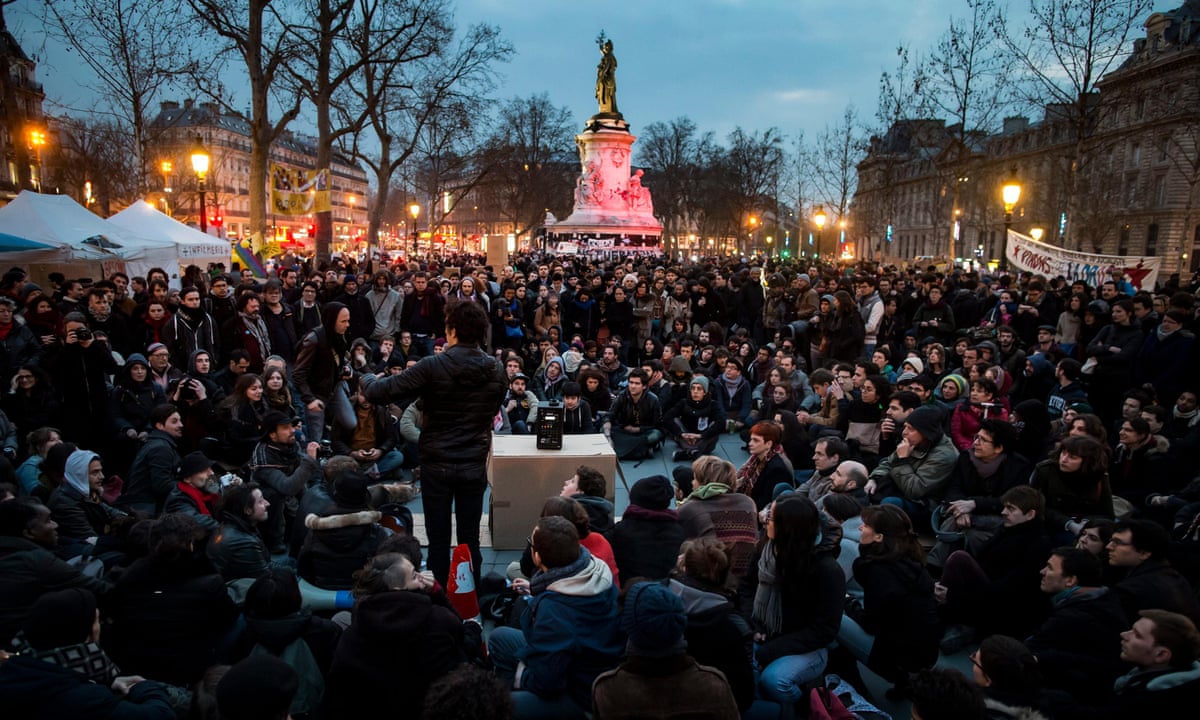For more than a week, vast nocturnal gatherings have spread across France in a citizen-led movement that has rattled the government

As night fell over Paris, thousands of people sat cross-legged in the vast square at Place de la Rpublique, taking turns to pass round a microphone and denounce everything from the dominance of Google to tax evasion or inequality on housing estates.
The debating continued into the early hours of the morning, with soup and sandwiches on hand in the canteen tent and a protest choir singing revolutionary songs. A handful of protesters in tents then bedded down to occupy the square for the night before being asked to move on by police just before dawn. But the next morning they returned to set up their protest camp again.
For more than a week, these vast nocturnal protest gatherings from parents with babies to students, workers, artists and pensioners have spread across France, rising in number, and are beginning to panic the government.
Called Nuit debout, which loosely means rise up at night, the protest movement is increasingly being likened to the Occupy initiative that mobilised hundreds of thousands of people in 2011 or Spains Indignados.
Despite Frances long history of youth protest movements from May 1968 to vast rallies against pension changes Nuit debout, which has spread to cities such as Toulouse, Lyon and Nantes and even over the border to Brussels, is seen as a new phenomenon.
It began on 31 March with a night-time sit-in in Paris after the latest street demonstrations by students and unions critical of President Franois Hollandes proposed changes to labour laws. But the movement and its radical nocturnal action had been dreamed up months earlier at a Paris meeting of leftwing activists.
There were about 300 or 400 of us at a public meeting in February and we were wondering how can we really scare the government?. We had an idea: at the next big street protest, we simply wouldnt go home, said Michel, 60, a former delivery driver.
On 31 March, at the time of the labour law protests, thats what happened. There was torrential rain, but still everyone came back here to the square. Then at 9pm, the rain stopped and we stayed. We came back the next day and as we keep coming back every night, it has scared the government because its impossible to define.
Theres something here that Ive never seen before in France all these people converge here each night of their own accord to talk and debate ideas from housing to the universal wages, refugees, any topic they like. No one has told them to, no unions are pushing them on theyre coming of their own accord.
The idea emerged among activists linked to a leftwing revue and the team behind the hit documentary film Merci Patron!, which depicts a couple taking on Frances richest man, billionaire Bernard Arnault. But the movement gained its own momentum not just because of the labour protests or in solidarity with the French Goodyear tyre plant workers who kidnapped their bosses in 2014. It has expanded to address a host of different grievances, including the state of emergency and security crackdown in response to last years terrorist attacks.
The labour law was the final straw, said Matthiew, 35, who was retraining to be a teacher after 10 years in the private sector, and had set up an impromptu revolutionary singing group at the square. But its much bigger than that. This government, which is supposed to be socialist, has come up with a raft of things I dont agree with, while failing to deal with the real problems like unemployment, climate change and a society heading for disaster.
Many in the crowd said that after four years of Hollandes Socialist party in power, they left felt betrayed and their anger was beginning to bubble over.
Jocelyn, 26, a former medical student acting as a press spokesman for the movement, said: There are parallels with Occupy and Indignados. The idea is to let everyone speak out. People are really sick and tired and that feeling has been building for years. Everything Hollande once promised for the left but gave up on really gets me down. Personally, its the state of emergency, the new surveillance laws, the changes to the justice system and the security crackdown.
The government and the Paris authorities are being cautious about the policing of the movement. An investigation is under way into the alleged assault by a police officer accused of hitting a student at a Paris high school last month during a demonstration against the labour overhaul.
The government is preparing possible concessions to students and youths to calm those expected to attend another such rally on Saturday.
Each night at Pariss Place de la Rpublique, the general assembly begins at 6pm and the crowd discuss ideas. Hundreds of demonstrators communicate using coded hand gestures: wiggling their fingers above their heads to express agreement or crossing their wrists to disagree.
Various committees have sprung up to debate a new constitution, society, work, and how to occupy the square with more permanent wooden structures on a nightly basis. Whiteboards list the evenings discussions and activities from debates on economics to media training for the demonstrators. No hatred, no arms, no violence, was the credo described by the action committee.
This must be a perfect mini-society, a member of the gardening committee told the crowd. A poetry committee has been set up to document and create the movements slogans. Every movement needs its artistic and literary element, said the poet who proposed it.
Demonstrators regularly help other protest movements, such as a bank picket over revelations in the Panama Papers or a demonstration against migrant evictions in the north of Paris.
Read more: www.theguardian.com









![[Video] How to get rid of bed bugs in Toronto](https://www.thehowtozone.com/wp-content/uploads/2019/10/maxresdefault-2-100x70.jpg)


